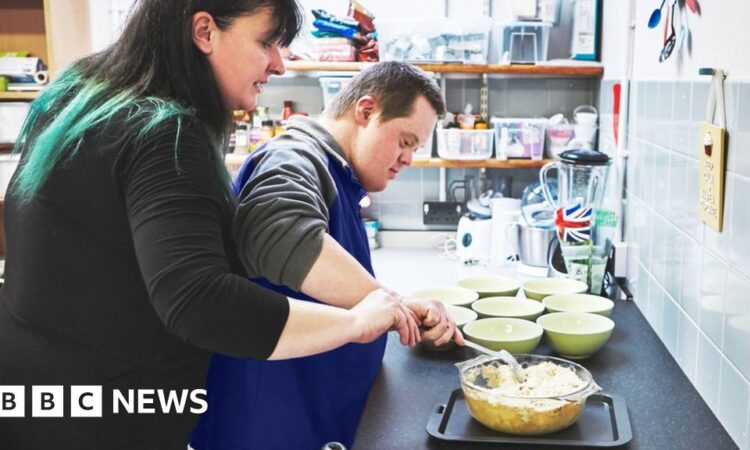
- By Robbie Meredith
- BBC News NI education correspondent
Image source, Getty Images/Dean Mitchell
Many of the organisations which stand to lose EU funding help people with learning difficulties to gain workplace skills
Organisations who help people with disabilities to work warned as far back as 2019 there was a “lack of detail” about what would replace EU funding.
A leader in the sector said their warnings had been “ignored and disabled people have been abandoned”.
About £40m a year of money from the European Social Fund (ESF) will come to an end on Friday 31 March.
The UK government’s Shared Prosperity Fund is due to replace the ESF funding.
But although an application process for £42m available over two years took place in December 2022 and January 2023, organisations who applied have still not been told if they will receive funding.
‘Most vulnerable will suffer’
BBC News NI has obtained a briefing paper from the Northern Ireland Union of Supported Employment (NIUSE) which was published in May 2019.
It warned then of “an absence of specific detail” about how the Shared Prosperity Fund would operate.
Image source, Kelvin Boyes
Now we are at crisis point with less than five days to go – Edyth Dunlop from NIUSE
“ESF is the primary and consistent source of funding for employment projects for disabled people in Northern Ireland,” it said.
The briefing paper also warned there was a “lack of clarity” about long-term funding and that replacing ESF was “a critical issue”.
The NIUSE represents a range of groups including Mencap, Disability Action, Action Mental Health and the Now Group who train and support people with disabilities to find employment.
The 2019 policy paper highlighted concerns over loss of EU funds
Edyth Dunlop from NIUSE said the 2019 briefing paper showed the organisation had been “forewarning” both the UK government and Northern Ireland administration for years about the end of ESF funding.
“Now we are at crisis point with less than five days to go and it could have been diverted,” she said.
“We have been ignored and disabled people have been abandoned.
“Often those most vulnerable are the easiest to ignore.”
Just over a third of disabled people in Northern Ireland are in work, compared with more than half in the rest of the UK.
Ms Dunlop told BBC News NI that “it doesn’t make sense to not continue vital services which address this”.
“From 1 April there will be no pre-employment training for disabled people or those most vulnerable unless actions and decisions are made now,” she said.
“We want to work with the local departments and develop solutions together and address the high rate of economic inactivity and disability employment gap.”
The Department for the Economy (DfE) was the managing authority for ESF in Northern Ireland.
In a statement to BBC News NI, DfE said it “empathises with the concerns of the sector currently supported under the NI European Social Fund (ESF) Programme”.
“The UK government has committed to fully replace EU structural funds through their Shared Prosperity Fund (SPF),” they continued.
“We have been clear with all providers for some time now that we have no ability to finance this activity beyond March this year when the SPF is due to start.”
The UK government’s Department for Levelling Up, Housing and Communities (DLUHC) is responsible for the Shared Prosperity Fund.
When asked by BBC News NI when groups in Northern Ireland would receive decisions about funding, the department said they were working to announce decisions “as soon as possible”.
They said they had “prioritised investment in economic inactivity support”.
However, they could not confirm to BBC News NI that funding decisions would be made before 31 March.
“The UK Shared Prosperity Fund will, at a minimum, match previous EU funding in Northern Ireland,” the DLUHC statement continued.
“As EU projects come to an end, funding from UKSPF will increase, reaching over £50m for Northern Ireland in this financial year and £74m in the next, to spread opportunity, help local businesses and improve pride in place.”






